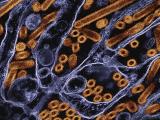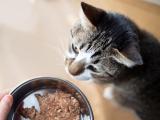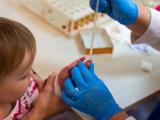Feb 2, 2011
APIC calls for mandatory flu shots for healthcare workers
Stiffening its position on a key issue, the Association for Professionals in Infection Control and Epidemiology (APIC) said today that all healthcare personnel (HCP) should be required to be vaccinated against flu unless they have medical contraindications. In 2008 APIC had recommended that HCP be required to get the vaccine unless they signed a declination form saying they understood the risks to patients. The new statement recommends that acute care hospitals, nursing homes, and other facilities employing HCP should "require influenza immunization as a condition of employment unless there are compelling medical contraindications." APIC says mandates have been shown to be the most effective measure for increasing HCP vaccination rates and that voluntary programs have failed to raise HCP coverage to acceptable levels. A national survey by the Centers for Disease Control and Prevention in 2010 put HCP coverage at 61.9%, the
statement notes. APIC said the requirement should be part of a comprehensive flu-prevention strategy that includes hand hygiene and respiratory etiquette. In supporting a mandate, APIC joins the Infectious Diseases Society of America and the Society for Healthcare Epidemiology of America (SHEA), which took similar positions in 2009 and 2010, respectively. "We must do a better job of immunizing HCP every year to ensure patient safety and protect those individuals at high risk of developing complications of influenza," APIC asserts.
New APIC position statement
October 2008 CIDRAP News story on previous APIC position
August 2010 CIDRAP News story on SHEA position
WHO confirms H5N1 in 7-year-old Egyptian boy
Egypt's Ministry of Health has confirmed H5N1 avian flu in a 7-year-old boy from Gharbia governorate, the World Health Organization (WHO) reported today. The boy experienced symptoms Jan 20 and was hospitalized that day. He is reported to be in stable condition, and officials say he was exposed to sick poultry. His case is Egypt's and the world's third H5N1 case this year, and the country's 122nd overall. Of those, 40 have been fatal. Global WHO-confirmed cases now stand at 519, including 306 deaths. Egypt's last case was confirmed Jan 20, in a 1-year-old boy.
WHO Feb 2 report
Indonesian provinces report H5N1 outbreaks
Animal health authorities in Indonesia are reporting H5N1 avian influenza in two neighboring provinces on Sumatra island, Jambi and South Sumatra, according to media reports. Kompas.com news reported that the virus struck thousands of chickens in the Jambi province regency of Kerinci, according to Xinhua, China's state news agency. A regency veterinary official saidl at least 4,164 chickens were infected. He said many villagers are reluctant to cull their chickens, but authorities are supervising that and other activities designed to slow the spread of the virus. Meanwhile, authorities in South Sumatra reported outbreaks in Prabumulih and Palembang, the Jakarta Post reported today. The outbreaks in Prabumulih came as a surprise, because the disease hasn't affected the area in the past several years, according to the report. Authorities in the area are culling birds, destroying eggs, and advising people to limit their exposure to
poultry. Indonesia is among the handful of countries where the H5N1 virus is endemic in poultry.
Feb 2 Xinhua story
Feb 2 Jakarta Post story
In other H5N1 developments, Hong Kong's agriculture ministry today reported that the H5N1 virus was detected in two chicken carcasses that washed ashore on a beach in Tai O, a fishing village partially located on Lantau Island, according to a government statement. A ministry spokesman said no poultry farms are located within a 3-km radius of where the birds were found, but precautions are being taken.
Feb 2 Hong Kong government press release
Medicago reports promising phase 2 results for H5N1 vaccine
Medicago, a Canada-based pharmaceutical company, yesterday announced promising interim results of a phase 2 trial of its H5N1 vaccine candidate. The company's vaccine is made with its proprietary virus-like particle (VLP) technology and is produced in Nicotiana benthamiana, which is related to the tobacco plant. The trial in 135 healthy volunteers showed the vaccine was safe and well tolerated at three different dosage levels. Medicago also said the vaccine, based on a strain from Indonesia, produced antibodies that reacted against multiple H5N1 strains, which it said suggests a cross-protective effect. Among adults under age 50 who received the 20-microgram dosage, 82% developed an immune response against the virus after the second dose. (The company did not detail what other dosages it tested.) The vaccine produced a fourfold increase in hemagglutination inhibition (HI) titers from baseline in 65% of subjects. The
same percentage had seroprotective antibody titers. Local site reactions were mild and similar at all three dosage levels. The company said the interim trial results will help it select the optimal dose for the next arm of the phase 2 trial, which will be conducted in 120 healthy adults with results expected in the second quarter of 2011. Nathalie Landry, Medicago's vice president for product development, said the company's novel vaccine technology is the first to report an immune response at such low dosages. "This is especially important as H5N1 vaccines are known to be poorly immunogenic in humans," she said in a statement.
Feb 1 Medicago press release
British study finds no pandemic flu benefit from seasonal flu vaccine
A British study in Vaccine found that seasonal flu vaccination didn't increase the risk of contracting 2009 H1N1 flu. Studies on the impact the seasonal flu vaccine on 2009 H1N1 infections have varied, with US and Australian researchers finding no association, Mexican investigators finding partial protection, and a Canadian group finding an increased risk of pandemic flu. On Jan 31 researchers from the US Food and Drug Administration (FDA) reported that the 2008-09 seasonal flu vaccine provided a modest boost in 2009 H1N1 antibodies. In the latest study, researchers performed a retrospective test-negative case-control analysis of patients who sought medical care from Jul 6 to Aug 16, 2009, before the rollout of the pandemic H1N1 vaccine, and had respiratory samples tested. Controls were patients who were treated for respiratory conditions and tested negative for the new virus. Researchers matched case and
control patients by age, week of sample, and region, for a final study sample that included 949 patients with confirmed H1N1 infections and 925 controls. They found that the seasonal flu vaccine did not have any effect on 2009 H1N1 infection, a finding that did not vary by age or hospitalization status. They said their findings highlight the importance of administering this year's trivalent flu vaccine to groups at high risk for complications from the 2009 H1N1 virus.
Feb 1 Vaccine abstract
Feb 1 CIDRAP News Scan on FDA study
















